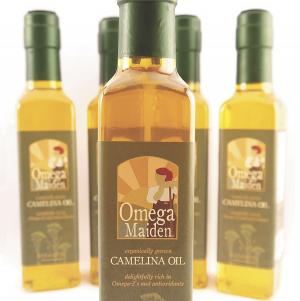2013 - Volume #37, Issue #4, Page #07
[ Sample Stories From This Issue | List of All Stories In This Issue | Print this story
| Read this issue]
Camelina Oil Competes With Olive And Flaxseed Oil
 |
 |
With twice as many Omega 3’s as Omega 6’s, it’s more nutritious than other cold-pressed oils. And, loaded with Vitamin E antioxidants, camelina has a much longer shelf life than flaxseed oil, its closest nutritional competitor. Camelina oil stays stable for as long as two years without going rancid.
Phil Batalden was impressed by the oil’s nutritional makeup. So 3 years ago when his daughter, Kathleen Batalden Smith, and her husband, Justin Smith, returned to the farm, he asked them, “If I grow it, will you sell it?”
After going through a learning curve, and some unusual weather, they successfully grew camelina seed, and the young couple started promoting their oil in 2012. “We sell it on our website, in 20 stores in and around Minnesota, and we are expanding to the West Coast,” Batalden Smith says. “The feedback we’ve gotten is good.”
The 8 1/2-oz. bottles sell for $12.99, and the oil can be used for all types of baking and cooking.
“It’s a bright gold oil that’s quite beautiful to look at,” Batalden Smith says, adding it has a high smoke point (450 degrees). It works equally well for sautéing and roasting vegetables and in salad dressings and baking. The website even includes information about using the oil for skin and hair care.
She and her husband developed the Omega Maiden Oils logo and run the business, from filling bottles to marketing to shipping. Currently another organic processor presses the oil for them.
Camelina seeds net about 30 percent of their weight in oil, and leftover meal (high in protein) is fed to the farm’s cattle.
Batalden Smith says her father planted 40 acres of camelina seed this year. He likes how it fits in with his crop rotation and that it’s drought resistant and a competitive weed suppressor. Typically the grain is swathed in mid July and combined with a pickup head. Camelina requires few inputs and fits well in the organic farm’s plan for sustainability.
Contact: FARM SHOW Followup, Kathleen Batalden Smith, 37574 Co. Rd. 11, Lamberton, Minn. 56152 (ph 507 822-6100; kathleen@omegamaidenoils.com; www.omegamaidenoils.com).

Click here to download page story appeared in.

Click here to read entire issue
To read the rest of this story, download this issue below or click here to register with your account number.




